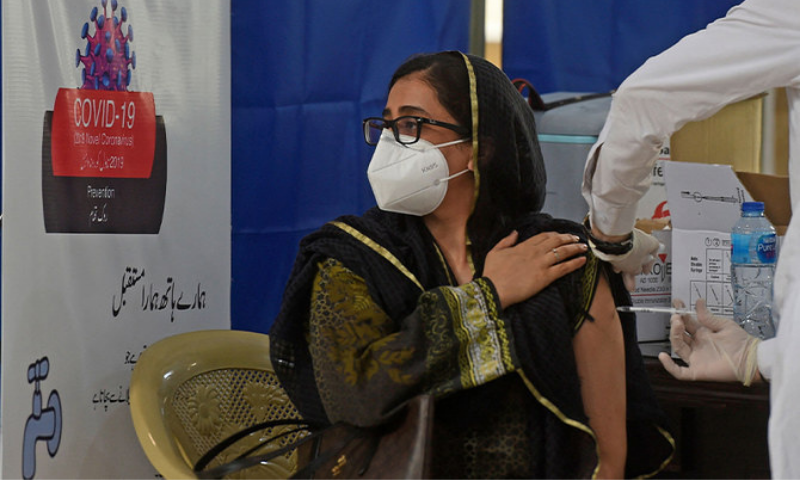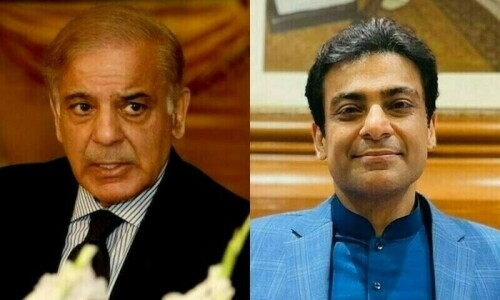ISLAMABAD: Although around five per cent of Pakistan’s total and 10pc of its eligible population has got at least one dose of the Covid-19 vaccine, the country is still one of the low-ranked countries where pace of vaccination remains very slow.
The data of federating units show that 35pc of eligible people have been vaccinated in Islamabad but only 3pc people opted for vaccination in Balochistan. In Sindh and Punjab, around 10pc people have received at least one shot.
Experts believe that lack of education, misconceptions, vaccine hesitancy and propaganda were the reasons behind slow pace of vaccination.
The Ministry of National Health Services (NHS) claimed that vaccine acceptance was not a big issue, but a majority of people wanted to get vaccinated near their residences and long waiting time kept them away.
While the world’s 25pc population has been vaccinated, 20pc people in India and Malaysia, 40pc in Turkey, over 50pc in the United States and 65pc in Israel and United Kingdom have got at least one shot.
According to documents available with Dawn, there are over 125 million people (over 18 years of age) eligible for vaccination in Pakistan. In Punjab, 66 million people are eligible for vaccination, 28m in Sindh, 19m in Khyber Pakhtunkhwa, 6.4m in Balochistan, 2.7m in Azad Jammu & Kashmir, 1.4m in Islamabad and 1.1m in Gilgit-Baltistan.
So far 12m people have registered themselves for vaccination in Punjab, 4m in Sindh, 3m in KP, 700,000 in Islamabad, 700,000 in the AJK, 320,000 in Balochistan and 270,000 in GB.
The data shows that 48pc people have registered themselves in Islamabad, 24pc each in the AJK and GB, 18pc in Punjab, 15pc in KP, 14pc in Sindh and only 5pc in Balochistan.
Over 2m people have been fully vaccinated in Punjab, 1m in Sindh, 460,000 in KP, 200,000 in Islamabad, 150,000 in the AJK and over 60,000 each in Balochistan and GB.
Microbiologist Prof Dr Javed Usman, while talking to Dawn, agreed that there was more reluctance in Pakistan against vaccination.
Some post-graduate doctors held a survey of at least graduate people during which people showed reluctance against vaccination but they could not give a valid reason for doing so.
“Majority of people answered that they will get sick, their DNA will be changed, they will contract Covid-19. One of the female post-graduate students, who conducted survey of graduate females, told me that majority of females said that vaccine will become reason of infertility and others said that they can die due to vaccine,” Dr Usman said.
He said the whole world was sitting on a time bomb as the Indian Delta variant was spreading in different countries and in the United Kingdom it was doubling in every two weeks.
“Currently, unvaccinated people and under-vaccinated communities are vulnerable to Covid-19. On the other hand the Delta virus has further mutated and named as Delta Plus. New virus has been reported in 10 countries and it is feared that immune escape virus can develop. Vaccines will be ineffective on such viruses,” Dr Usman said.
Vice Chancellor of University of Health Sciences Dr Javed Akram said that education level and vaccine hesitancy were the major issues of Pakistan.
“It is a fact that there is a huge difference in vaccinated people of India and Pakistan but in India 4m doses are produced daily. In Pakistan, supply of vaccine is also an issue. However, I suggest masses to get themselves vaccinated as we have to vaccinate over 70pc population at the earliest,” he said.
Spokesperson of the Ministry of NHS Sajid Shah said that actually, to everybody’s surprise, vaccine acceptance was so far not a big issue.
“Largely, lack of nearby access and long waiting time keep people away. Moreover, considering the fact that multiple vaccines are in the field, non-availability of vaccine of choice is also an issue,” he said.
According to the data of the National Command and Operation Centre, 40 deaths and 1,037 new cases were reported on Thursday. There were 31,767 active cases, while 2,102 patients had been admitted in hospitals.
Published in Dawn, July 2nd, 2021














































